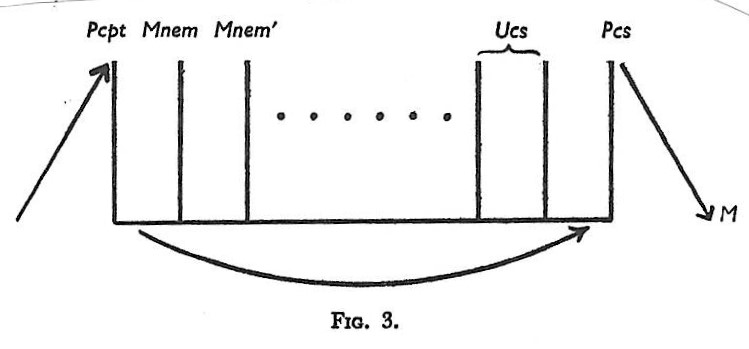
Thus, we find in Freud’s apparatus an intriguing distinction to be made between the vibrance of incoming perceptions and the somewhat less vibrant nature of our memories. Is this actually the case? Furthermore, might our dreams bring a vibrance to memories that are engaged in the creation of the dream?
Freud (1900, pp. 540-541) now applies his formulation specifically to the protective devices that are engaged in dreams. He is introducing the guardian function of the psyche that he would later label the “super ego”:
“We [are] only able to explain the formation of dreams by venturing upon the hypothesis of there being two psychical agencies, one of which submitted the activity of the other to a criticism which involved its exclusion from consciousness. The critical agency . . . stands like a screen between the latter and consciousness. Further, we [can identify] the critical agency with the agency which directs our waking life and determines our voluntary, conscious actions. . . . [This being the case, we must] locate the critical system at the motor end of the apparatus. We will now introduce the two systems into our schematic picture and give them names to express their relation to consciousness (Fig. 3):
Freud (1900/1953, pp. 541-542) goes into further detail regarding dynamics operating at the motor end of his apparatus:
“We will describe the last of the systems at the motor end as ‘the preconscious’, to indicate that the excitatory processes occurring in it can enter consciousness without further impediment . . . We will describe the system that lies behind it as ‘the unconscious’, because it has no access to consciousness except via the preconscious, in passing through which its excitatory process is obliged to submit to modifications.
In which of these systems, then, are we to locate the impetus to the construction of dreams? For simplicity’s sake, in the system Ucs . . . the process of forming dreams is obliged to attach itself to dream-thoughts belonging to the preconscious system, But when we consider the dream-wish, we shall find that the motive force for producing dreams is supplied by the Ucs.; and owing to this latter factor we shall take the unconscious system as the starting-point of dream-formation.”
Thus, to unbundle Freud’s phrases a bit, it is proposed by Freud that the energy (and content) that initiate a dream comes from unconscious sources. Furthermore, intervention of the unconscious occurs just at the point when the dreamer is about to take action. Dream content is censored, according to Freud, precisely because the dreamer worries that action is about to take place—though we know that actions (and movements in general) are blocked when we are dreaming (other than some subtle movements of our larynx and sometimes our limbs).







